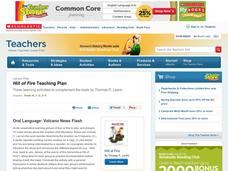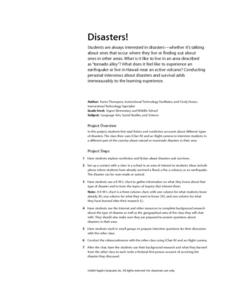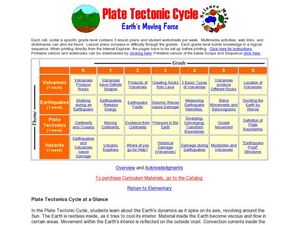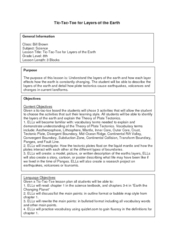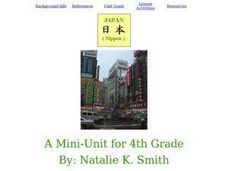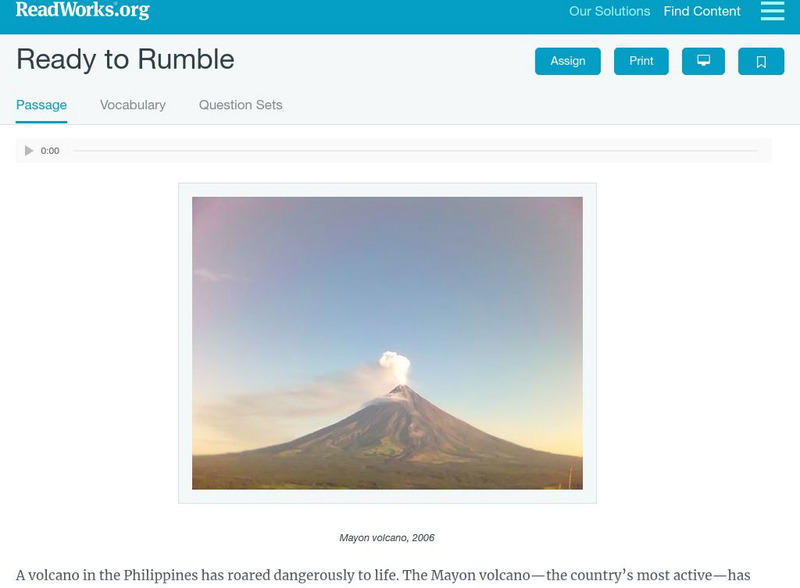Curated OER
Ready-Set-Tech: When a Volcano Erupts
Wouldn't it be a blast to uncover the science behind volcanic eruptions? Explore, research, and examine the nature of volcanoes with three fun hands-on projects kids will love. First the class takes to the Internet to research volcanoes....
Curated OER
Earthquakes and Volcanoes
Even though volcanoes look alike, they can be very different based on the types of lava that erupts from their surface. Learn about strata volcanoes, shield volcanoes, and the varying viscosity of lava with an engaging hands-on...
Scholastic
Hill of Fire Teaching Plan
Some books are perfect for drawing connections between multiple subjects. The book Hill of Fire becomes the hub for three very different, yet related activity ideas. First the class hones their oral language skills by creating an...
Curated OER
Disaters!
Students read a fiction and nonfiction accounts about different types of disasters. The class uses iChat AV and iSight camera to interview students in a different part of the country about natural or manmade disasters in their area....
Curated OER
Volcanoes: Mount Vesuvius
Students explain how volcanoes form. In this earth science activity, students identify the different types of volcanoes. They create brochures about Mt. Vesuvius before and after the eruption.
Curated OER
Tall Tales: Larger Than Life Stories
Review the elements of tall tales with your class. Take a look at their genesis and purpose. Different types of figurative language found in tall tales are included such as hyperbole, simile, and metaphor. Before reading an American tall...
Curated OER
Coasts
Students explain the different types of marine coasts and where they are located in the United States and its territories. They explain and identify some of the life forms that inhabit different marine coastal regions.
Curated OER
Adverbs
Students encounter the various functions of using different types of adverbs. Students use various adverbs to describe how, where and when events happen. Students show examples of adverbs in various newspaper articles.
Curated OER
Exploring Landforms
Second graders discuss the different types of landforms throughout the world. They pick one and research and present it to the class.
Curated OER
Plate Tectonic Cycle
Students explore the Earth's movements by completing worksheets. In this plate tectonics activity, students define such natural disasters as volcanoes, earthquakes, tsunamis and mudslides and discuss their connections to plate tectonics....
Curated OER
Keeping Our Pets Safe In An Emergency
Students fill out worksheets that teach them how to prepare for emergency situations and how to enable animal safety in emergency situations. In this emergency lesson plan, students talk about different kinds of emergencies and how they...
Curated OER
Tic-Tac-Toe for Layers of the Earth
Eighth graders identify the different layers of the earth. In this earth science lesson, 8th graders choose a project to do from a given list according to their learning style. They present their finished project in class.
Curated OER
Social Studies: Exploring Japan
Fourth graders examine the culture and environment of Japan, beginning with a KWL chart. They use clay and cups of water to construct representations of the Japanese Islands. After designing flags representing farming and food, 4th...
Curated OER
What's In A Name
Second graders read Chrysanthemum by Kevin Henkes. They then discuss where various names come from. They create a individualized biopoem and publish it on word processing software. Their poems are compiled into a class book and presented...
Curated OER
Health: The Three Dimensions
Pupils examine the three dimensions of health, wealth, and happiness from both emotional and social perspectives. Among the week-long activities are discussions about good and poor habits, minimizing risks by proper planning and...
Read Works
Read Works: Ready to Rumble
[Free Registration/Login Required] Students read about three different types of volcanoes. A question sheet is available to help students build skills in classifying and categorizing.


